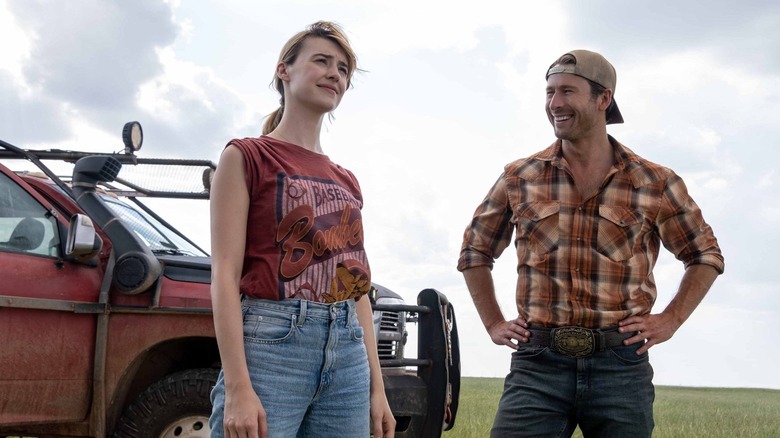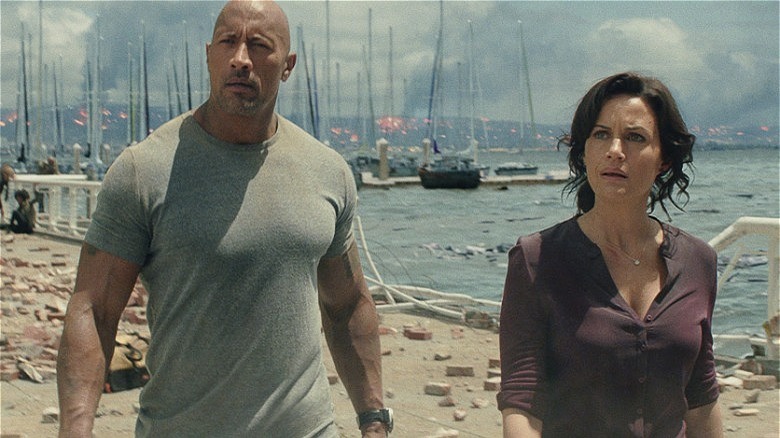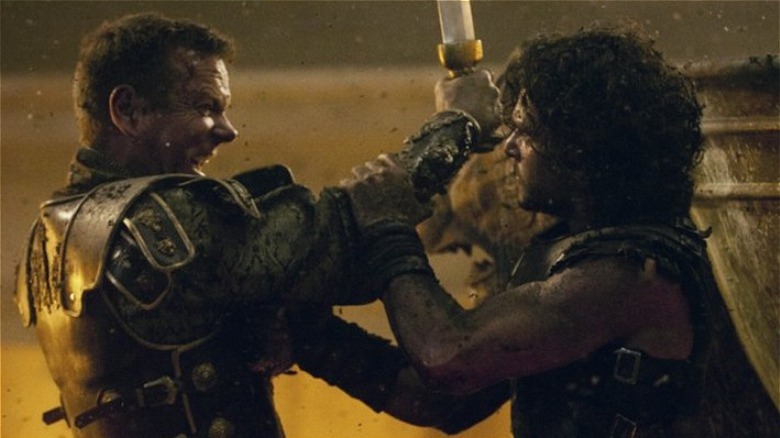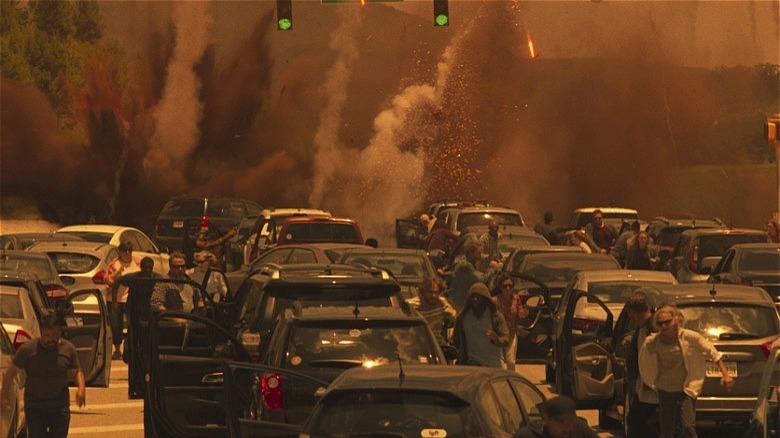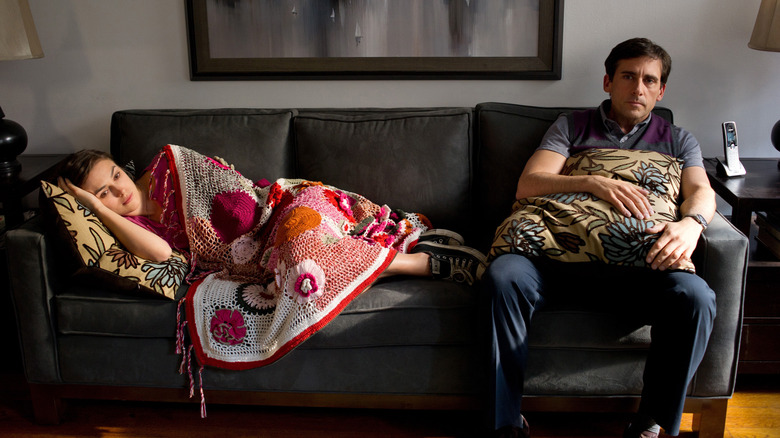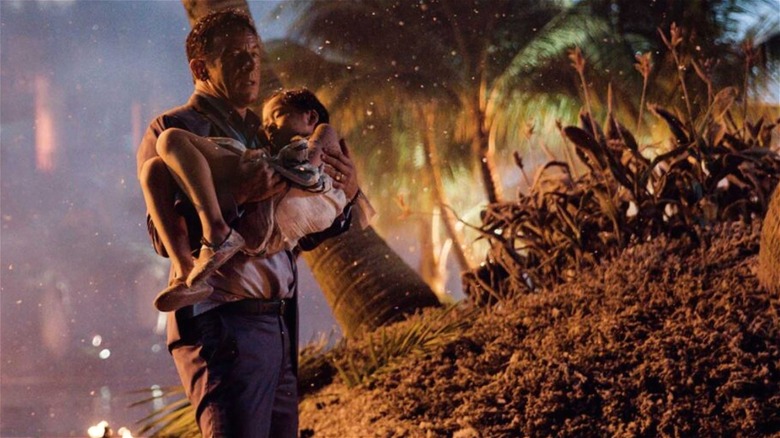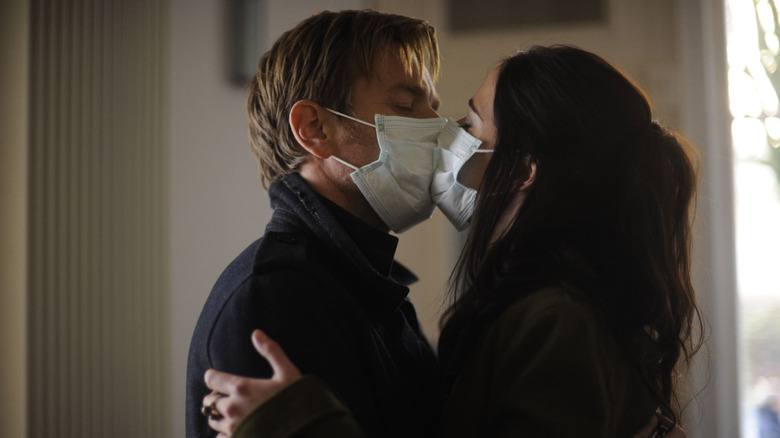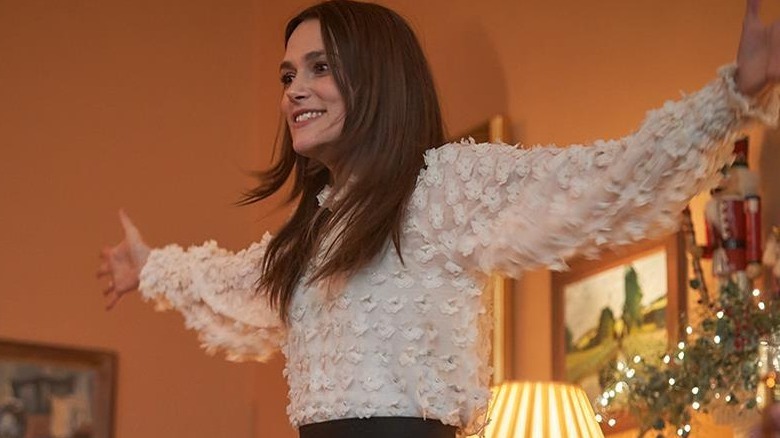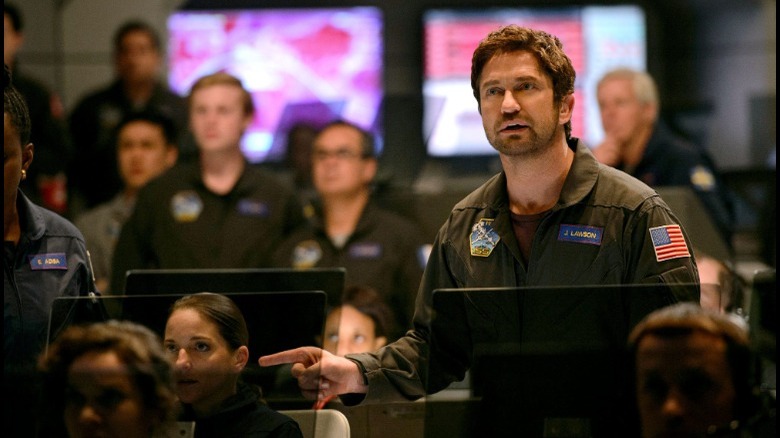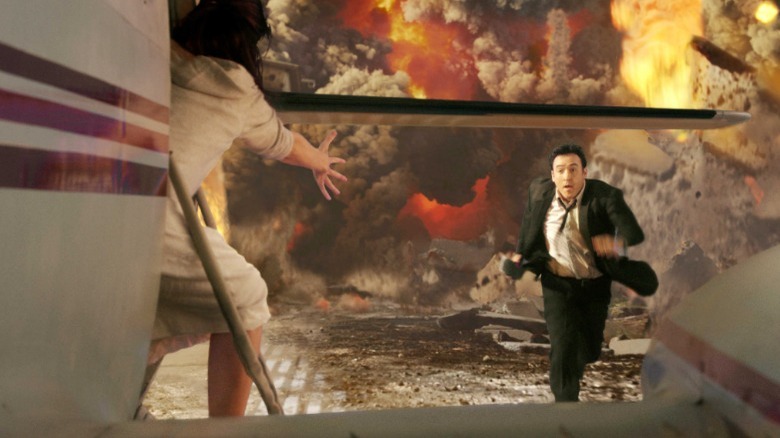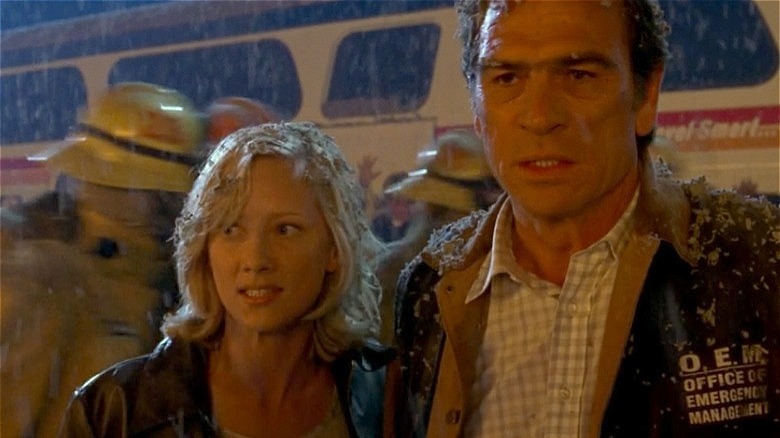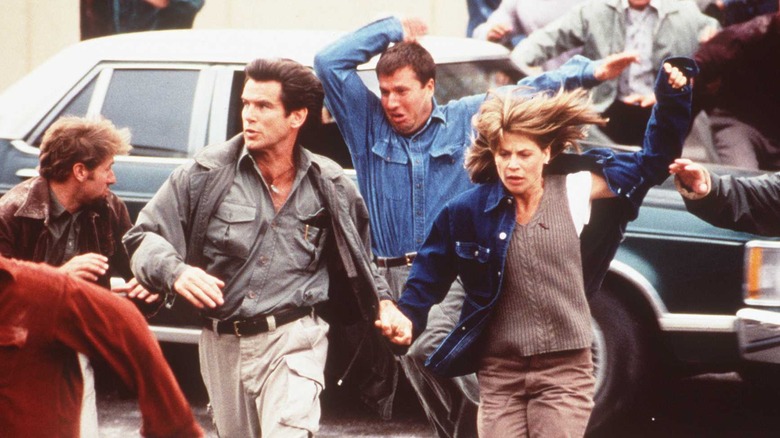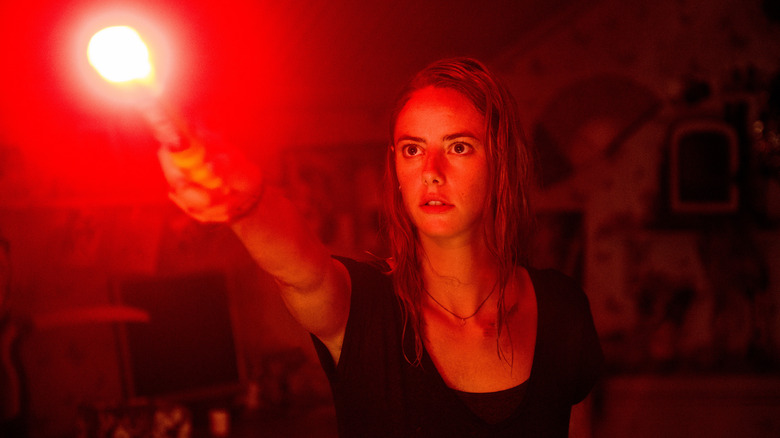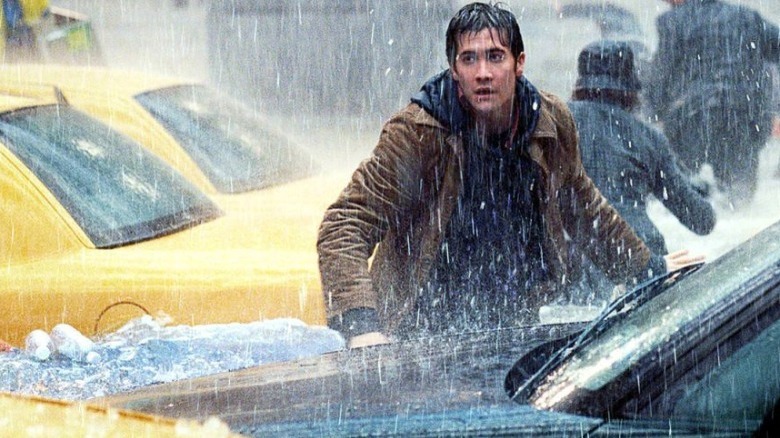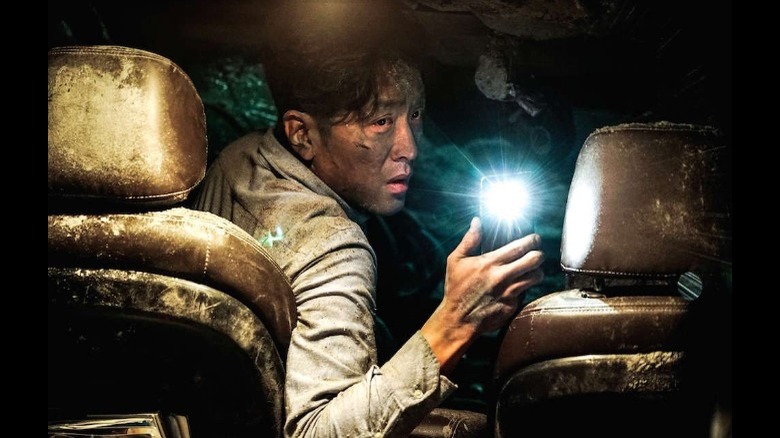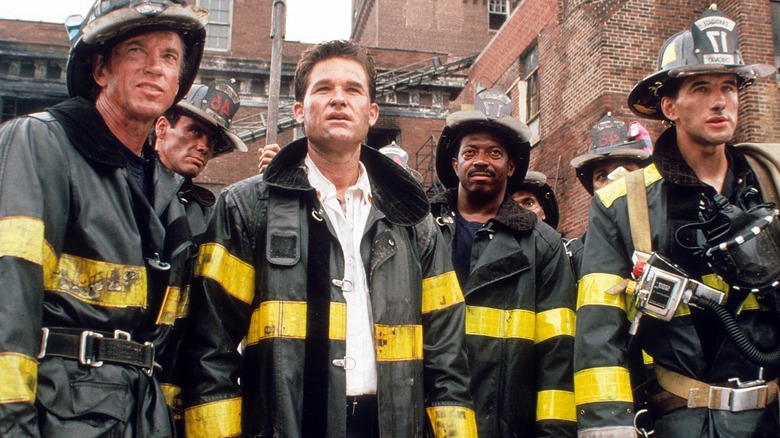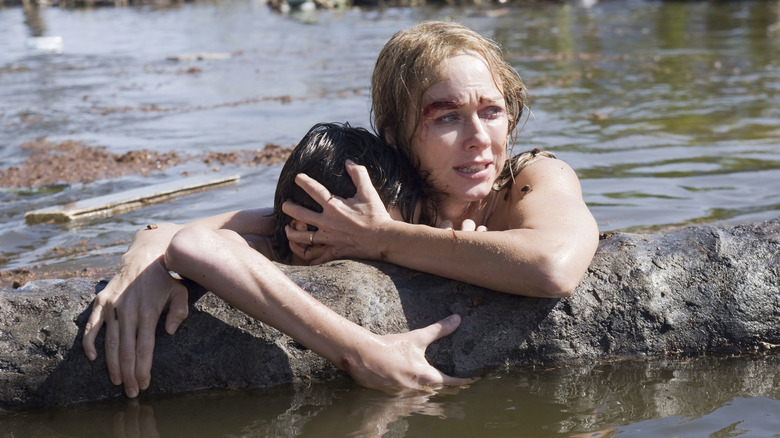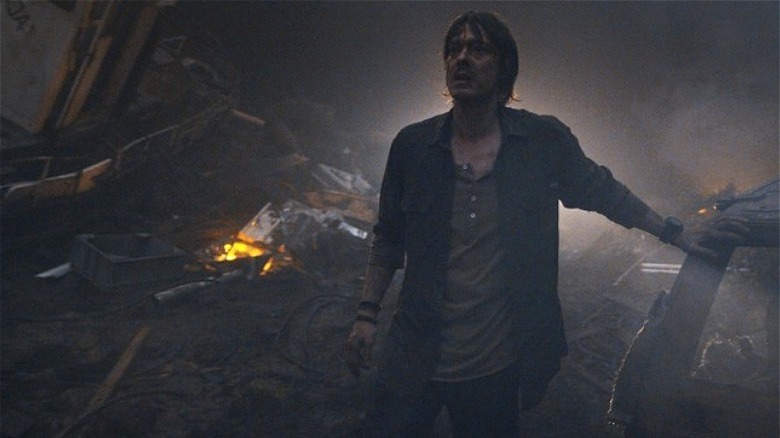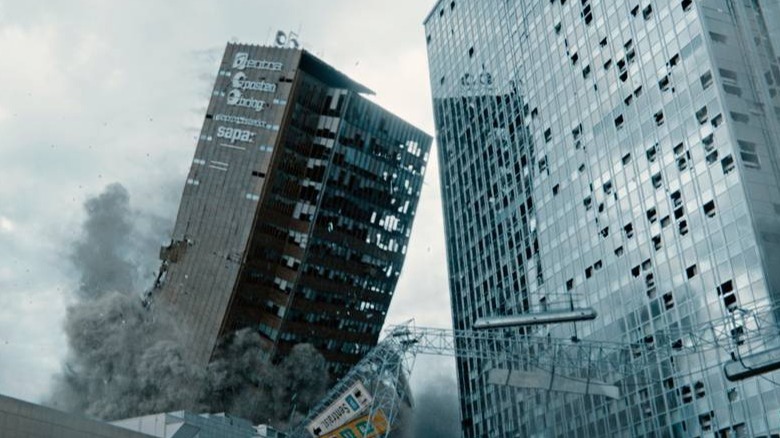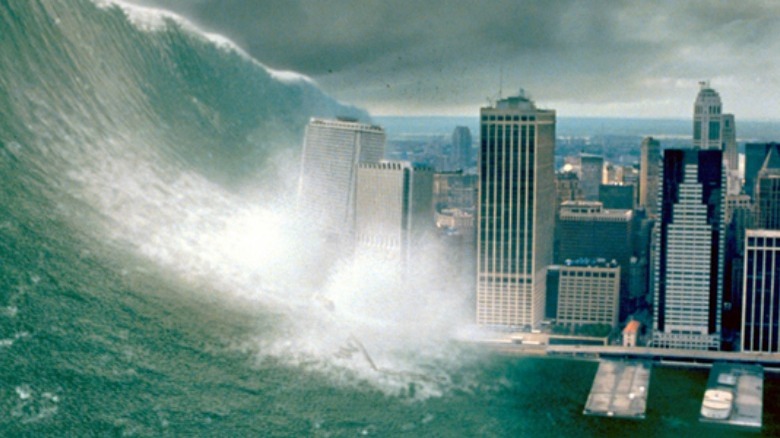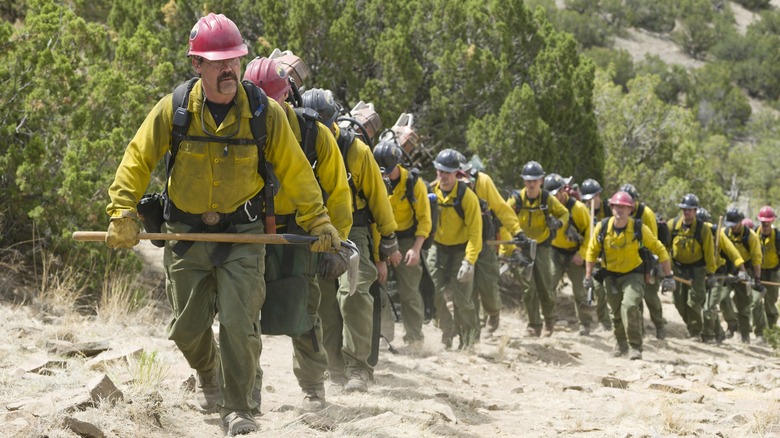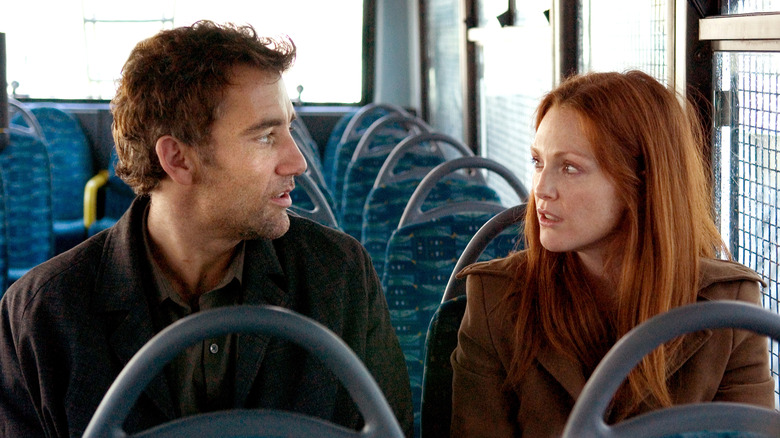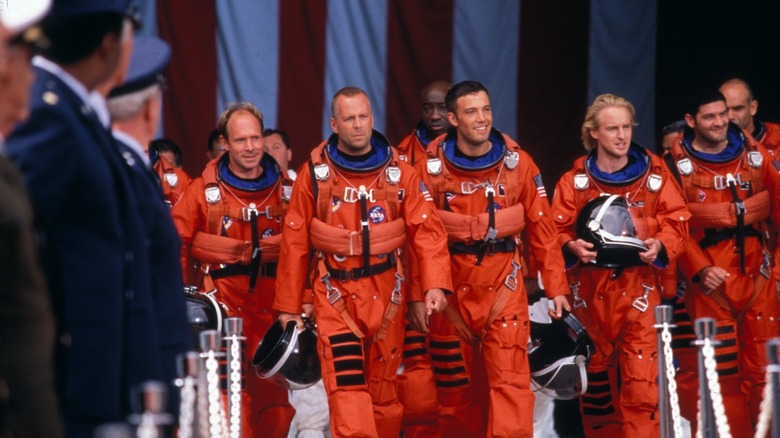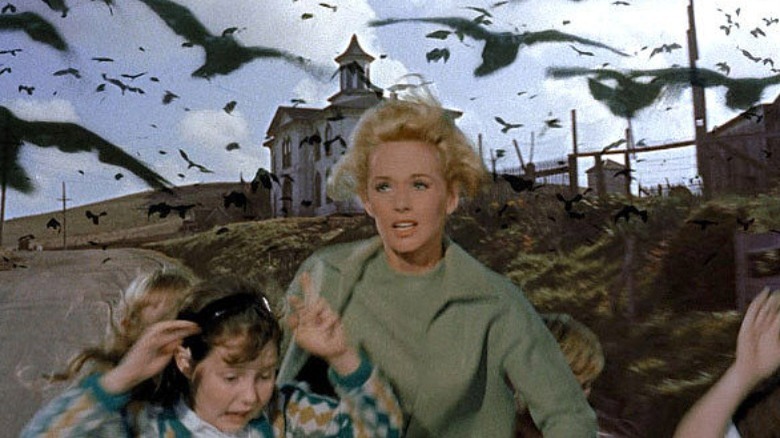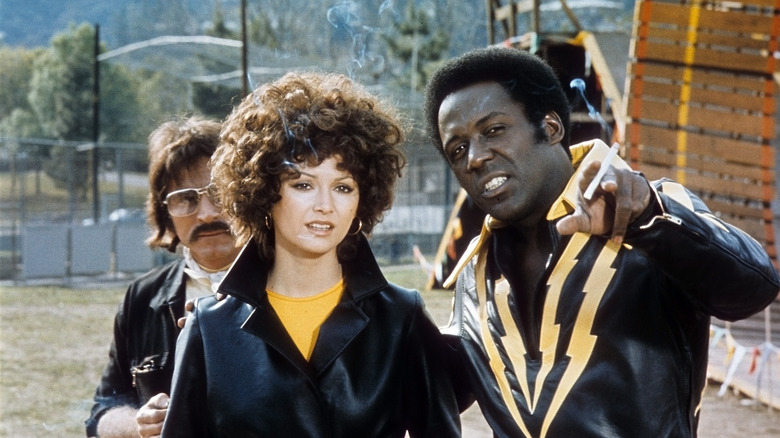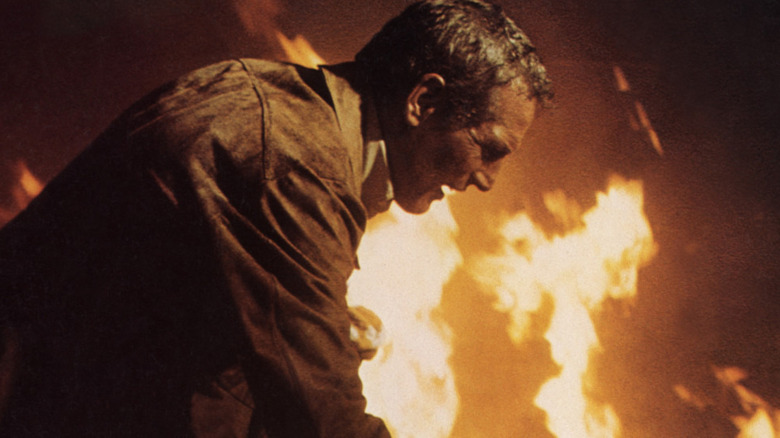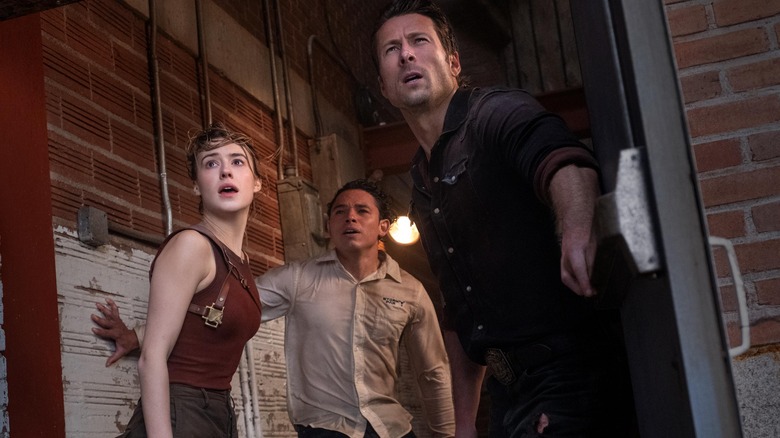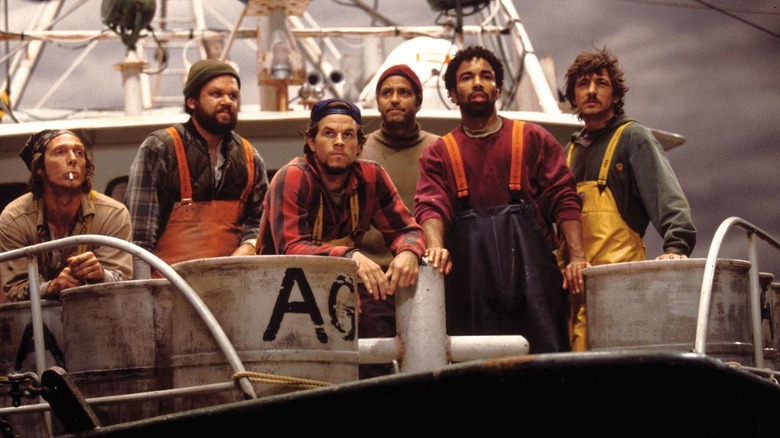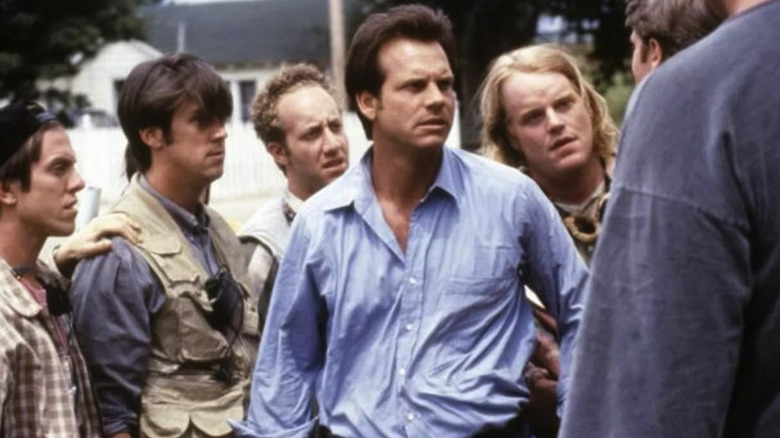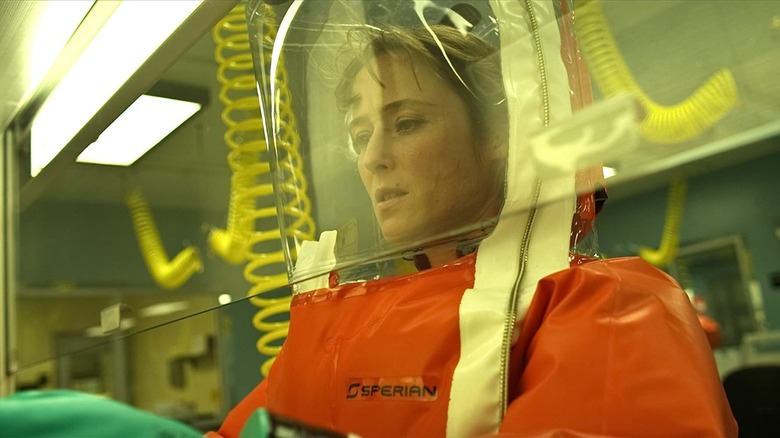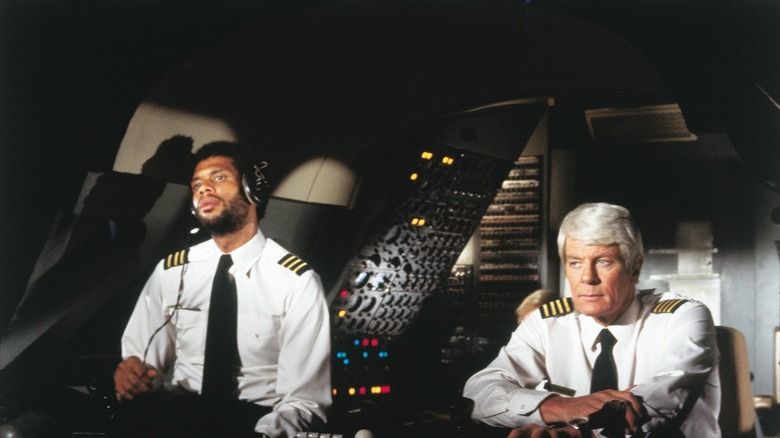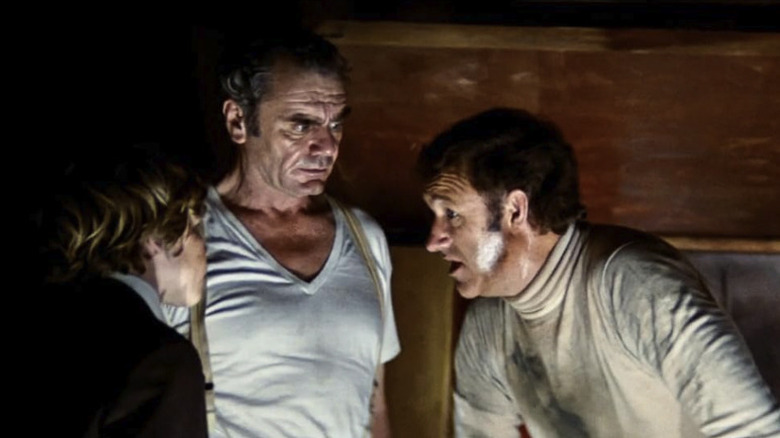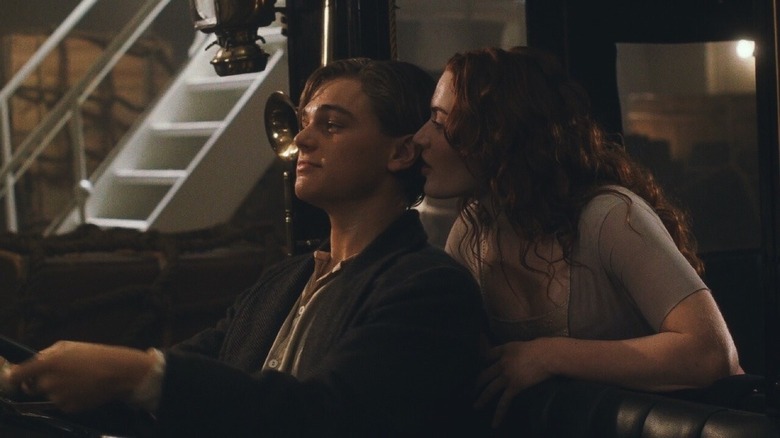The 32 Best Natural Disaster Movies, Ranked
The concept of good vs. evil is at the heart of almost every movie ever made, but how that antagonistic force takes shape always varies. We can look at certain genres, such as superhero films or horror movies, and envision what a villain looks like. Sometimes they'll wield a knife or an axe, or perhaps they'll attempt to destroy the world to gain incalculable power. But arguably some of the most terrifying antagonists in films can't be visualized in the same way, because they all emanate from nature; if nothing else, they become so much more terrifying specifically because you can't reason with these antagonists and they have no sentience like human beings.
A natural disaster is at the heart of one of 2024's biggest movies, Lee Isaac Chung's long-awaited "Twisters," a follow-up to Jan de Bont's 1996 film all about storm chasers in Oklahoma. But natural disasters don't have to be storms — they can take the form of a tsunami, or a volcano, or even an iceberg. What are the best natural disaster movies? Let's run down the best of the bunch.
32. San Andreas
While Dwayne Johnson's "Black Adam" might have taken an exhausting several years to get off the ground, that same delay doesn't apply to his many deeply digital summer blockbusters, especially disaster movies. For a while, it seemed like every summer brought another Johnson-led disaster vehicle, one where he'd perform incredulous stunts, banter with some supporting players, and exhibit the requisite pathos when the movie called for it. "Skyscraper" might be a cheap riff on South Korea's "The Tower" (itself a riff on "The Towering Inferno") but it works well enough. "Rampage" isn't one of the greatest video game adaptations, but it's got a stacked cast and plenty of monster mayhem. Then, of course, there's "San Andreas," easily the best entry on Johnson's disaster flick resume.
Johnson stars as Ray Gaines, a Los Angeles helicopter rescue pilot, in Brad Peyton's compelling Roland Emmerich homage. When the titular San Andreas fault erupts, it's absolute mayhem. There are collapsing skyscrapers, shattered dams, and even a tsunami in the San Francisco Bay. All the while Gaines endeavors to rescue his family, including daughter Blake (Alexandra Daddario) and ex-wife Emma (Carla Gugino). Does it make much sense? No. Is it an absolute blast? No doubt about it.
31. Pompeii
In 2014, Paul W.S. Anderson's "Pompeii" grossed just $117 million worldwide against a reported $100 million budget. Those are grim figures. They're not "Cutthroat Island" grim, though as an early augur for the decline of disaster movie reliability, it was as clear a signal as any. Audiences, on account of shifting viewing habits and tastes, just don't flock to disaster movies like they used to. Especially when the likes of the Marvel Cinematic Universe can deliver the same destructive scale with considerably more heart and fan fealty. It's what makes the likes of "Greenland" so refreshing, and while "Pompeii" isn't "Greenland," it's a flop that's considerably more fun than it had any right to be.
A sort of "Gladiator-lite," Anderson's "Pompeii" stars "Game of Thrones" actor Kit Harington as Milo, a young gladiator whose interpersonal dealings with Cassia (Emily Browning) feel kind of silly when Mount Vesuvius erupts and fireballs descend upon the city. While Anderson saves most of the destruction for the end, the embellished-though-no-less-fascinating look at Pompeii's destruction is both cinematically rewarding and historically compelling.
30. Greenland
No different than Dwayne Johnson, "300's" once up-and-comer Gerard Butler has settled into a reasonable routine of schlocky, big-budget disaster outings. There's "Geostorm," of course, which while fun, is strictly by-the-books. Then there's Ric Roman Waugh's "Greenland," a movie whose trailers yielded no promise. Once again, Butler was going to be thrust into the middle of an apocalyptic event. The effects didn't look great, and a COVID-19 delay should have relegated "Greenland" to the realm of pandemic cinematic casualties (see: "The Empty Man"). Yet, like the latter, "Greenland" transcended convention, a movie with bad marketing that is considerably, considerably better than it should have been.
Butler stars as John Garrity, an instructional engineer who, along with his family, is given priority shelter just as an interstellar comet is set to collide with earth, all but certainly destroying the planet. With a stripped-down approach and an eye for human-level terror, "Greenland" eschews the scale of its peers for something more personal and, thus, terrifying. There are kidnappings, close calls, and plenty of teary monologues as Butler and company grapple with the forthcoming end of the world. It's not a masterpiece, but it's arguably the strongest Western disaster movie of the last 10 years. Plus, with a sequel confirmed, there's no better time to get familiar with "Greenland."
29. Seeking a Friend for the End of the World
There are several films on this list that feature a world-ending asteroid scenario, but this is the only one that uses this setting as a backdrop for a touching story of friendship and love between characters played (beautifully) by Steve Carell and Keira Knightley. "Seeking a Friend for the End of the World" dances a fine line between comedy and drama as we see what happens to society as our time on this planet nears its conclusion.
This is basically the kind of story that happens off-screen while stuff goes boom in something like "Armageddon" or "Deep Impact." Those two movies squeezed in bits of character drama and gallows humor, while "Seeking a Friend for the End of the World" puts the gallows humor front and center. As a result, it ends up being much more emotional and intimate than either blockbuster. Add in a great supporting cast of indie favorites — including Melanie Lynskey, Patton Owsalt, Adam Brody, Derek Luke, Connie Britton, and Rob Corddry — and you've got a criminally overlooked gem.
28. Skyfire
Simon West's "Skyfire" is "Jurassic World: Fallen Kingdom's" entire first act stretched to feature length. It's a big, brazen, deeply silly disaster movie, the first-ever Chinese disaster feature done on this scale. Filmed in both English and Chinese, both versions are basically the same, since neither really demands all that much of the performers involved. That's not an innately bad thing, either. Sometimes audiences just want big, dumb disaster movies, and "Skyfire" more than fits the bill.
Tianhuo Island experienced a catastrophic volcanic eruption 20 years ago. Wentao Li (Xueqi Wang), a geologist, vowed never to return. Unfortunately, his daughter, Meng (Hannah Quinlivan) is presently working on the island, now a world-famous theme park run by businessman Jack Harris (Jason Isaacs). Everyone converges on the island, and from the start, the audience is introduced to plenty of screensaver beauty, the island's natural vistas inspiring plenty of awe and wonder. Of course, the central volcano will almost certainly erupt again, and when it does, "Skyfire" lives up to its title. What it lacks in characterization and logic it more than makes up for in simple, big-budget thrills. The sky literally rains fire, waves of lava crash over unsuspecting tourists, and everyone just barely dodges plenty of threats as they endeavor to escape. It's not going to endure, but for fans of silly disaster features, "Skyfire" knows how to honor convention.
27. Perfect Sense
There are countless epidemic-oriented movies out there, and a couple of them have already made it on this rundown, but none are as heartbreaking or original as this one."Perfect Sense" follows a blossoming romance in tough times, as an epidemic spreads across the world, causing people to lose each of their five senses one by one.
That plot synopsis alone tells you this is no traditional natural disaster flick. Expect to see how society begins to slowly crumble as people lose more of their senses. Ewan McGregor and Eva Green are phenomenal in this unique drama that is powerful, engaging, and even sexy at times. But beware, because it's also pretty damn depressing. The film played at Sundance in 2011, but barely reached theaters anywhere in the world. It deserved better. If you can find it on cable or streaming, it'd make "Perfect Sense" to watch it. Oh, and trivia fans may get a kick out of seeing Denis Lawson play the boss of McGregor's character. Lawson, who portrayed Wedge Antilles in the original "Star Wars" trilogy, is McGregor's real-life uncle.
26. Silent Night
Camille Griffin's debut feature, "Silent Night," is deceptively dark. Billed as a black comedy and boasting a cast — Keira Knightley, Annabelle Wallis, and Lucy Punch are among the esteemed crop of performers — that can deliver the goods, it takes a while for audiences to catch up with exactly what Griffin is planning. Resultantly, "Silent Night" emerges as one of the best feel-bad Christmas movies ever. An apocalyptic disaster movie with bite, this one lingers.
Knightley stars as Nell, a well-off woman who, along with her husband, Simon (Matthew Goode), hosts a Christmas gathering for family and friends alike. This isn't a normal gathering, however. That night, everyone there plans to die by taking their lives together on account of a poisonous cloud of gas sweeping the globe, killing everything with whom it comes into contact. To combat what is ostensibly a slow, painful death, the government hands out euthanasia pills, and pretty much the entire population is on board. Well, everyone other than Art (Roman Griffin Davis), Nell's oldest son (and the son of director Camille Griffin). While the ending calls to mind "The Mist" more than a decade before, "Silent Night" is nonetheless a grim exploration of science versus faith, family versus society, and the gaseous purple skies spelling doom.
25. Geostorm
Audiences would be forgiven for thinking "Geostorm" was the handiwork of one Roland Emmerich. It's not. Dean Devlin, a longtime writer-producer for Emmerich's films, made his directorial debut with this 2017 end-of-the-world disaster flick. Disaster movie mainstay Gerard Butler stars as Jake Dawson, the chief architect for a series of satellites, dubbed "Dutch Boys," capable of neutralizing extreme weather patterns on Earth. Giant tsunami? Just have the Dutch Boys take care of it. In conventional disaster-movie fashion, Lawson is disgraced. Jumping forward a few years, a scourge of malfunctioning satellites has created the titular geostorm. Rather than stopping threats, the satellites are creating them.
Audiences loved it, of course. Sure, it was ridiculous, following every disaster movie beat to a tee, but that didn't stop moviegoers from eating up the heaps of computer-generated destruction thrown their way. Still, alongside Emmerich's own 2022 output, "Moonfall," Devlin's "Geostorm" might have started the wave, no pun intended, of disaster movie flops. With a worldwide cumulative gross of $221 million, "Geostorm" didn't turn a profit, likely accounting for Emmerich's need to independently fund "Moonfall" years later. Just as the world ends, so too does the heyday of disaster flicks with theatrical legs.
24. 2012
While Mayan scholars contended that Western audiences wildly misinterpreted the Mesoamerican Long Count calendar, one that pointed to December 21, 2012, as the seeming end of the world, that didn't prevent an entire generation from believing, whether earnestly or not, that the world would be over by 2012. "Glee" dedicated an entire episode to the phenomenon. The National Geographic Channel offered an entire slate of post-apocalyptic programming for doomsday viewers. Obviously, the world didn't end, though audiences worldwide were still left with one delicious artifact from the time — Roland Emmerich's "2012."
Arguably the most famous doomsday adaptation, Emmerich's 2009 fictionalized account of the world ending sees an incredulous John Cusack leading his family to safety as everything collapses around him. There are mega-tsunamis, earthquakes, and plenty of questionable physics as computer-generated denizens fall to their doom while Cusack's Jackson Curtis and company just barely dodge death time and time again. Like most of Emmerich's output, "2012" prioritizes spectacle over character, and while it's blatantly illogical, few filmmakers can capture mass-scale destruction quite like him. Who needs science when you can just have Yellowstone burst?
23. Volcano
Oh, the age-old "Volcano" versus "Dante's Peak" debate. Both have their merits and a qualified, committed cast, and both are about as old-fashioned as a 1990s disaster movie could be. While "Dante's Peak" released first, "Volcano" does have it beat in one key area: the visual effects. With a combination of miniatures, computer imagery, and staging, "Volcano" is the rare disaster movie with both scale and an undercurrent of realism. While the VFX especially stretch credulity at times, "Volcano" holds up remarkably well. There's a fire in here, and it's looking to ignite.
Tommy Lee Jones stars as Mike Roark, the director of Los Angeles' Office of Emergency Management. As is always the case, he predicts disaster, namely the impending formation of a volcano in the La Brea Tar Pits. And as is also always the case, no one takes Mike seriously until it's too late. Soon enough, all of Los Angeles is up in flames as lava races through the streets. "Dante's Peak," on the other hand, might have "Volcano" beat in terms of set pieces, tension, and character development, though "Volcano's" lava-spewing destruction is the more visually engaging of the pair. It's the kind of cinematic scale that reminds audiences of how uniquely powerful the movies are in terms of their power to transport and inspire, and, yes, to destroy.
22. Dante's Peak
Pierce Brosnan, between a couple of his James Bond adventures, found time to try and save a small town from a volcano long thought to be dormant. Spoiler alert: It's no longer dormant! And who better to be teamed up with than Sarah Connor herself, Linda Hamilton, who plays the mayor of the movie's titular Washington town. This was one of two competing volcano-based action thrillers released in 1997, the other being the aptly titled "Volcano," which featured an eruption in the heart of Los Angeles and a cast that included Tommy Lee Jones, Anne Heche, and Don Cheadle.
Despite not having Jones, Dante's Peak is a much superior disaster film thanks to some pretty intense and brutal moments, including a steaming lake burning a grandmother to death and Brosnan's character suffering a compound fracture. Director Roger Donaldson makes it all feel and look real, and Brosnan and Hamilton, as well as countless fleeing/screaming extras, sell the terror of trying to outrun molten lava.
21. Crawl
"Crawl" isn't a conventional monster movie. For starters, like the unsung gem "Burning Bright," "Crawl" augments its toothy thrills with a Category 5 hurricane. Most conspicuously, though, it's got French Extremist progenitor Alexandre Aja behind the camera. Aja, best known for both "High Tension" and the considerably-more-brutal remake of Wes Craven's "The Hills Have Eyes," is no stranger to gruesome, Grand Guignol thrills. "Crawl" is brutal. While a sequel remains a possibility, audiences will always have what is arguably the scariest alligator movie ever made.
Kaya Scodelario stars as Haley Keller, a University of Florida swimmer (that's important later) who drives into the eye of the storm to check on her father, Dave (Barry Pepper). Dave is unresponsive in the house's crawlspace, though the storm and his condition are the least of their worries. Stalking the house is a pack of hungry, hungry alligators. Aja makes fantastic use of both Scodelario's "Maze Runner" physicality and the swelling storm to stage several nail-biting set pieces. While it's more monster movie than disaster movie, the hurricane is as much a threat as the monstrous beasts outside. "Crawl" is truly one-of-a-kind, a unique merging of disaster movie scale with intimate, bloody creature-feature horror.
20. The Day After Tomorrow
Moviegoers love disaster movies, but Western audiences especially don't seem to take such epics' core messages to heart. Roland Emmerich's "The Day After Tomorrow," arguably the most famous disaster movie of the early aughts, isn't an especially serious film. It wants to be, what with all the brooding familial conflict, professions of love, and last-minute sacrifices. It can't resist its own destructive scale, however, consistently sacrificing pathos for more popcorn thrills. There's some merit to that. Better still, despite the rocky science, there's a pretty conspicuous and compelling message at its center: climate change is killing the planet.
Dennis Quaid stars as Jack Hall, a paleoclimatologist who, like his disaster movie peers, predicts a cataclysmic event no one believes will happen ... until it's too late. Hall suspects from his research that the shifting climate is liable to create another ice age, and sure enough, it does. Before then, though, it sends the planet's weather into overdrive. There's giant hail, California tornadoes, and plenty of New York tsunamis to wash away taxicabs and pedestrians. "The Day After Tomorrow's" science is there for fun and destruction, though in the years since release, it's been rendered strangely sobering, a reminder of how fragile and delicate the planet really is. That recognition might take some of the fun away, but in its place is plenty of somber contemporary gravitas.
19. Tunnel
Kim Seong-hun's "Tunnel" is among the best disaster movies too few audiences have seen. This South Korean import stars Ha Jung-woo as Lee Jung-soo, a car salesman trapped beneath the rubble of a tunnel collapse as he drives through it on his way home from work. Miraculously, Jung-soo survives alongside a handful of others. At first, the public is on his side as the South Korean government launches a rescue operation. As the weeks move on, opinion split — the chances of a successful rescue are slim, and all the time spent trying only delays construction on another nearby tunnel.
Seong-hun, like his contemporary Bong Joon-ho, has no qualms about adroitly interrogating the perceived incompetence of his own government. In many ways, "Tunnel" is the public infrastructure sequel to Joon-ho's "The Host," a piercingly funny yet simultaneously distressing portrait of singular persons let down by a self-aggrandizing bureaucracy. Bae Doona is sensational as Se-hyun, Jung-soo's wife, one of the few people (understandably) committed to the rescue, even when all hope seems lost. While "Tunnel" doesn't have the scale of its disaster movie brethren, it's uncommonly human, fiercely funny, and oh-so deliciously infuriating as it interrogates the innate ineptitude of the bureaucrats supposedly there to help.
18. Backdraft
I'm not sure why there haven't been more thrillers crafted based around the concept of raging fires, but it would seem to be an untapped source for Hollywood. "Backdraft" rates as one of only a handful of genuinely memorable titles focusing on the dangers of massive fires and the firefighters who try to stop them, and this movie will have you double-checking your smoke detectors before you go to sleep. This one is a bit of a cheat since an arsonist is responsible for the fires, but there just aren't enough fire-related thrillers like this, so it gets a pass and makes our list.
You might not remember, but Ron Howard directed this one back when he was good at helming thrillers such as Apollo 13 and Ransom. The fire sequences are visually and sonically remarkable, and the movie also boasts a pretty fantastic cast that includes Kurt Russell, Robert De Niro, Donald Sutherland, William Baldwin, Jennifer Jason Leigh, Scott Glenn, Rebecca De Mornay, and the late, great J.T. Walsh. Chances are you didn't see the 2019 sequel, "Backdraft 2," which starred Joe Anderson but also included appearances by OG actors Baldwin and Sutherland.
17. The Impossible
For the most part, tidal waves and tsunamis have been relegated on the big screen to serving as catalysts for other tragedies, or for just being one of the side effects of an even larger disaster. But this harrowing, true story — directed by J.A. Bayona — puts the tsunami front and center for a major portion of the movie.
The Bennett family — Henry (Ewan McGregor) and Maria (Naomi Watts) and their three young boys (one of whom is played by Tom Holland, making his live-action film debut) — find themselves violently separated while on vacation when a massive wave strikes their resort in Thailand. Watts and McGregor are phenomenal, and what befalls them together and separately will pull the heartstrings right out of your chest. There's something to be said about the amazing visual effects in the film as well, which make the rushing water feel as if it's coming directly at you.
16. The Wave
While American disaster movies struggled to find their place in an ever-changing cinematic landscape, Norwegian director Roar Uthaug (of the fantastic "Cold Prey" slasher series) thrust himself into the spotlight with a stripped-down disaster flick that puts most everything Hollywood has done this century to shame. Geologist Kristian Eikjord (Kristoffer Joner) is working his final day in Geiranger while his family scuttles about. He has some sensors placed in and around the nearby fjords, and naturally, his readings spell doom. He suspects the Åkerneset crevice is poised to collapse, the result of which will be an enormous tsunami in the fjord, one more than capable of totally obliterating Geiranger.
His colleagues don't take him seriously. Neither do the disaster officials responsible for sounding the alarm. In standard disaster movie fashion, it's Kristian versus the world, until, of course, it's far too late. While the early goings of "The Wave" are admittedly conventional — often, these movies rest on the trope of the protagonist's predictions being incredulously ignored — Uthaug stages the titular wave with more gothic gusto than most. For example, a 10-minute countdown accompanies the race to safety as the wave closes in. It's remarkably tense, and while "The Wave" loses some steam in the aftermath, it's a standout beat. More than that, it's a case study on how to make the fantastic feel very real and urgent.
15. The Quake
Three years after "The Wave," director John Andreas Andersen returned with the much loonier, though no less engaging, sequel "The Quake." The surviving cast of "The Wave" returns for a disaster movie redux. Once more, Kristoffer Joner's Kristian Eikjord predicts mass destruction. This time, Kristian is estranged from his family, who are now living in Oslo, following the events of the first film. While his actions have been celebrated by many, others still consider him a doomsday kook, someone seeing cataclysmic devastation where there isn't any. Here, he begins to read seismic activity around Oslo, convinced that an earthquake is poised to occur any day.
Of course, Kristian is right. Not only that, but as mentioned, his entire family currently resides in Oslo (the Eikjord family has terrible luck). "The Quake" certainly strains credulity more than the first, par for the course in trying to franchise a singular disaster movie. It's the "Scream" of natural disasters, really, and Kristian is the Sidney Prescott. Disaster will follow him everywhere. Still, like Uthaug, Andersen has a knack for staging CG mayhem with a distinct sense of realism. For all the plot contrivances, the quake itself is liable to leave audiences breathless, both in scale and sheer ruination. The tension is no less palpable, and unlike the initial go-round, this time there are real stakes for the surviving players. While it's not "The Wave," it's about as good as any sequel to that was going to be.
14. Deep Impact
Hollywood just loves doubling up on similar ideas, and here's one of the world-ending asteroid movies that hit the big screen in 1998. The other one is better, but we'll get to that eventually. Though fairly melodramatic, "Deep Impact" leverages an impressive ensemble cast to show what an end-of-the-planet scenario might look like if the world's governments made an effort to salvage the population — or some of it. And while all that activity happens on Earth, there's a team in space trying to stop it too.
The real wow factor comes when a smaller asteroid hits Earth and causes some serious destruction, long before Roland Emmerich shook up the planet with "2012." Also, it's hard to go wrong with Morgan Freeman as the president, which was back when having a Black president in a movie was an easy way to remind audiences that we were in the future. If we ever have to deal with an asteroid impact of this level, I hope Morgan Freeman gives all the speeches to the American people as we recover.
13. Only the Brave
Joseph Kosinski's "Only the Brave" is adapted from the true story of the Granite Mountain Hotshots, a group of firefighters who lost their lives while combating the Arizona Yarnell Hill Fire in June 2013. On the surface, "Only the Brave" looks like it would leak machismo, the kind of movie dads get together to screen on the weekends with little audience relevancy beyond that. Yet, with Kosinski (of, yes, "Top Gun: Maverick" fame) at the helm and a strong cast, "Only the Brave" is arguably the greatest wildfire movie ever made. And it's not even close.
Josh Brolin stars as Eric Marsh, a fire and rescue superintendent committed to certifying his ragtag team of firefights as hotshots, the groups that combat large forest fires both regionally and nationally. The early goings straddle disaster movie pathos with the mechanics of workplace comedy, the crew incapable of getting it together when it counts most. As it progresses, however, Kosinski surreptitiously imbues "Only the Brave" with a heartbreaking inevitability. Most of these characters, at some point, will die. A tearjerker in the purest form, "Only the Brave" eschews familiarity with its firm commitment to character, the real story, and some of the most breathtaking (and terrifying) forest fire footage around.
12. Children of Men
In what might be the most slow-moving disaster in this entire line-up, "Children of Men" eliminates the one thing that allows humans to survive great long-term disasters: the ability to reproduce. For 18 years, mankind has been infertile. Chaos reigns around the world and only the United Kingdom can claim a "stable" government. This is a disaster unlike any other — because it's not killing off any people who are already alive, but rather chipping away at their hope for the future, which is almost worse. Even more terrifying: there's no medical solution.
Bolstering the unique premise, director Alfonso Cuaron ("Gravity") makes this film a must-see, literally, for its stark visuals. Several single-shot sequences are positively mind-blowing (and predecessors to what Alejandro Gonzalez Intarritu would accomplish with "Birdman"). Clive Owen, as the story's reluctant hero, gives easily the best performance of his career to date, and the esteemed Michael Caine (as a flatulent drug dealer) deserved an Oscar nomination. Despite stellar reviews, "Children of Men" actually lost money at the box office. If you've never seen it, seek it out.
11. Armageddon
In the wake of the 1996 film "Independence Day," there was a slew of disaster movies that arrived in theaters that were focused on more natural occurrences. (The only reason why "Independence Day" isn't on this list is because the presence of an alien invasion isn't exactly natural, but it absolutely follows in the vein of the Irwin Allen-produced titles that popularized this genre.) 1997 brought a warring pair of films about destructive volcanoes, and the summer of 1998 brought us two very different takes on what would happen if an asteroid was headed for Earth. The DreamWorks film "Deep Impact" does have some action and drama, but is a more somber affair less focused on a daring rescue than it is on musing what the end of days would be like in such a catastrophic situation. "Armageddon," being a Michael Bay film, is...not a somber affair.
It is arguably one of the most ridiculous titles on this list, if not the most ridiculous title (to the point where there's a famous bit of the DVD commentary in which co-star Ben Affleck dings the film for its inaccuracies, and Bay essentially tells him to put a sock in it). But "Armageddon" is also a quintessential disaster movie, offering a massive runtime, a widespread ensemble cast, and a terrifying specter of a potential future in which asteroids bear down on Earth. As with other Bay films, approaching "Armageddon" with logic is a fool's errand; now, at least, it's enjoyable to watch the film simply to marvel at a cast of Dad Movie actors, from Bruce Willis to Steve Buscemi to Will Patton to Billy Bob Thornton, and envision a time when audiences embraced the utterly absurd in their mainstream blockbusters.
10. The Birds
Casual audiences might not know that Alfred Hitchcock's seminal "The Birds" is adapted from Daphne du Maurier's short story of the same name. As the scribe behind the likes of "Rebecca" and "Don't Look Now," it's no wonder "The Birds" is more horror classic, less "Birdemic: Shock and Terror." There's plenty to be said about Hitchcock's own legacy as both person and filmmaker, though independent of that, "The Birds" endures as second only to "Jaws" as the animal attack feature to end all animal attack features.
Tippi Hedren stars as Melanie Daniels, a socialite in San Francisco who makes the trek, as all do, to Bodega Bay to meet a boy (Rod Taylor's Mitch Brenner). While there, the birds absolutely lose it, preventing Melanie from leaving as the denizens of Bodega Bay fight for their lives against flocks of killer birds. Mixing footage of real birds with puppets, the effects don't necessarily stand the test of time, though they don't really need to. Hitchcock's tension is rooted less in the birds, and more in the terror a mere utterance of them can induce. Killer birds might not be a common natural disaster, though it's a scary one nonetheless.
9. Earthquake
1974 was a very good year for big-budget disaster films boasting stacked ensemble casts. There's another movie we'll get to shortly that depicted a bit more of a focused disaster, but "Earthquake" brought together a very impressive ensemble along with some notable behind-the-camera folks as well, even if the end result is cheerfully silly. As the title implies, "Earthquake" is focused on a debilitating quake in Southern California that destroys basically all of Los Angeles. Though fortunately the city in real life has not experienced a quake quite that destructive (the one in the film measures a 9.9 out of 10 on the Richter scale), "Earthquake" being a big-budget movie means it had to go big or go home.
With the film being written by Mario Puzo (yes, the same man behind "The Godfather" novel), the cast that ranges from Charlton Heston and Ava Gardner to Genevieve Bujold and Richard Roundtree has plenty to dive into, although some of the plot machinations are a bit more soap opera-esque than you might want from a film meant to capture the chaos and terror created by the Big One. The film lives on in spirit at Universal Studios Hollywood, as a centerpiece section of the hourlong Studio Tour — though primarily because of the quake itself, not the characters.
8. The Towering Inferno
As noted above, 1974 was a hell of a year at the box office for disaster movies. "Earthquake" does have an impressive cast, but while "The Towering Inferno" has a more localized disaster centered around a 138-story skyscraper in San Francisco, it arguably has the bigger and more impressive cast. Paul Newman, Steve McQueen, William Holden, Fred Astaire, and Faye Dunaway are among the names in the ensemble. The cast was so remarkable that Newman, McQueen, and Holden all demanded top billing, and all received it ... depending on how you look at the film's poster and titles, which place their names at three separate points to make it look like one is in front of the other at different angles. (With fifty years' hindsight, it feels like Newman and McQueen had a more deserving claim on top billing, in spite of Holden's lengthy career.)
Like a couple other films on this list, "The Towering Inferno" effectively balances the scale of the disaster as a fire strikes the skyscraper, while also creating a series of believably compelling character dramas and subplots. The epic-length film (clocking in at 165 minutes) netted eight Oscar nominations, including one for Best Picture. It didn't win that big title, but still walked away with three Oscars when all was said and done.
7. Twisters
It's funny to think of "Twisters" as being a sequel to the 1996 film "Twister," because aside from some brief references in the prologue to the Dorothy data model that was so central to the original film (and a few other "Wizard of Oz"-related name-drops), you'd be forgiven for assuming this is closer to a full-on remake or reboot. None of the characters from "Twister" show up here or are mentioned, and if you squint, you can see how some of the characters in the Lee Isaac Chung film line up with characters from the original. Screenwriter Mark L. Smith compounds the trauma that drives heroine Kate Cooper (a fairly flat Daisy Edgar-Jones), as she witnesses the deaths of two of her friends as well as her boyfriend in a devastating opening sequence. Five years later, she's content behind a desk at the National Weather Service before her old friend and fellow twister survivor Javi (Anthony Ramos) convinces her to join him for a week in Oklahoma to try out an experiment again to tame tornadoes during a massive outbreak.
Javi very clearly has eyes for Kate, but so too does the gregarious "tornado wrangler" Tyler (Glen Powell), and ... well, you don't need to guess how that will resolve. "Twisters" takes far too long to get going, or at least to get fun, although it's worth emphasizing that Powell absolutely understands what movie he's in from the start, and steals it from everyone else. Once the rest of the movie gets on his wavelength, "Twisters" offers a glimpse into a more propulsive, slightly old-fashioned summer blockbuster. That said, Chung seems vastly more comfortable in the quieter, character-driven moments, which isn't surprising considering his past work, but it makes the effects-driven sections a little less lively.
6. The Perfect Storm
In the wake of the 1997 film "Titanic," there were a few other attempts to capture the lightning-in-a-bottle feeling of a disaster movie at sea. One of the first follow-ups (and the best) was the summer-2000 film "The Perfect Storm," starring George Clooney, Mark Wahlberg, and John C. Reilly. "The Perfect Storm" now seems almost close to a quintessential Dad Movie, the kind of thing that you could comfortably expect to see on the weekend schedule for TNT or TBS for many years, in spite of the harrowing true story being depicted within the film. Set mostly on the Andrea Gail in 1991, "The Perfect Storm" shows us how a group of fishermen tried and failed to get beyond that eponymous storm, instead losing their lives in the process.
A large part of why the film works so well is its director, Wolfgang Petersen, who was no stranger to either disaster films or films set in and around watercraft. By the time "The Perfect Storm" rolled around, he'd already directed the classic German epic "Das Boot" and would later go on to direct the 2006 adventure "Poseidon." Petersen did a remarkable job of staging this slow-burn thriller, balancing character development with the looming threat of the eponymous storm. There's no happy ending here, but Petersen and the ensemble cast do a fine job of making us care about the people on that boat even if we know their end is already written.
5. Twister
Nearly thirty years later, it's both very easy and very strange to imagine that this film has inspired a legacy sequel of sorts in the form of "Twisters." It's easy because the film was a solid start to the summer of 1996, boasted an impressive ensemble cast, and had an unnervingly straightforward hook, with a story following a ragtag group of storm chasers on the prowl for big tornadoes in Oklahoma. But it's strange because this movie is as entertaining as it is irretrievably silly; writers Michael Crichton (yes, really) and Anne-Marie Martin chose to fuse action with a riff on screwball comedies like "His Girl Friday," with Jo and Bill (Helen Hunt and Bill Paxton) bickering over their failed marriage while also trying not to get destroyed by massive twisters. (And would you believe that the two of them romantically reunite before all is said and done?)
What helps most of all is director Jan de Bont, who leapt from the propulsive actioner "Speed" and brought a similarly energetic pace here. Aside from the very brief and creepy prologue in which young Jo's father is killed by a twister, and a smattering of setup, this movie is as speedy and unexpected as the twisters themselves. There's no denying that this movie is ridiculous, even as it wears its references on its sleeves. (Not just, for example, that we see a glimpse of "The Shining" on a drive-in movie theater screen, but that one character is named Stanley and another is named Kubrick.) The difference is that "Twister" is just the right kind of summer-movie ridiculous.
4. Contagion
Of course, sometimes, you can't even see the natural disaster itself, only its aftereffects. These days, "Contagion" is even more terrifying to watch than it was back in the fall of 2011. From director Steven Soderbergh, "Contagion" documents the spread of a deadly virus across the globe, as well as the fallout from those wildly spreading misinformation to the public. To look at the movie now through a post-COVID-19 prism is to see a disturbingly, eerily prescient story about how quickly disaster can strike in this fashion and how easily bad actors can manipulate people. Soderbergh worked with a massive cast for this disaster film, with everyone from Matt Damon to Gwyneth Paltrow to Marion Cotillard to Laurence Fishburne to a very scummy Jude Law showing up for the story.
If there's anything truly holding back "Contagion," it's the fact that the film documents everything from a virus mutating to killing millions of people to a vaccine successfully being created and administered, all within the span of 106 minutes. Some of the films on this list revel in depicting the effects of a given disaster, and others try to move quickly through the destruction. "Contagion" is a breathlessly paced film, but sometimes to the point where you wish it would slow down just a bit to allow us to experience each horror just a bit more.
3. Airplane!
Whoever said that every natural disaster film has to be a drama? (And whoever said food poisoning wasn't a natural disaster?) The 1980 film "Airplane!" is one of the greatest comedies ever, and it perfectly skewers disaster films of the 1970s while also more directly spoofing a '50s-era drama called "Zero Hour," which has ... well, pretty close to the same plot of this film. The brooding ex-pilot Ted Striker (Robert Hays) is thrust back into the cockpit on a nighttime flight from Los Angeles to Chicago when the pilots and a good chunk of the guests fall ill due to debilitating food poisoning. Add to the plot that Ted's ex (Julie Hagerty) is one of the flight attendants, his old commanding officer (Robert Stack) has to talk him down to a safe landing in the Windy City, and the fact that Leon is getting laaaarger and you get a film that is absolutely ridiculous and also absolutely brilliant.
What "Airplane!" picks up on very effectively is how many disaster films are an inch or two away from being comedic without even trying, and the film is willing to try just about anything for a laugh, from casting previously well-known stone-faced actors like Stack, Lloyd Bridges, and Leslie Nielsen to throwing everything including feces at the fan (at one point literally). You may be reading this entry and saying "Surely 'Airplane!' can't fit on the list.' But yes, it can, and don't call us Shirley.
2. The Poseidon Adventure
While "The Poseidon Adventure" was not the first splashy, big-budget natural-disaster movie, it is the pinnacle of the form. It has an undeniably catchy and terrifying premise: A Titanic-esque cruise liner capsizes and turns end over end with only a smattering of survivors. The motley crew of remaining guests, who are now castaways, does their best to survive the dangers of the Poseidon lest they drown. But while "The Poseidon Adventure" belongs to the Irwin Allen school of filmmaking, its strength lies in its fiercely committed ensemble cast, including five past Oscar winners: Shelley Winters (who got another nod for her role here), Jack Albertson, Ernest Borgnine, Red Buttons, and a fresh-off-"The French Connection" Gene Hackman as a fiery reverend.
Although Hackman, in particular, dives fully into the bombastic nature of his character, it's that intense willingness to sell the cheesy script that elevates this film beyond its fellow '70s-era disaster epics. Like many natural disaster movies, there is a slight tinge of the goofy in "The Poseidon Adventure," but the cast is so fully on board to sell the '70s-era version of excess. At the time, "The Poseidon Adventure" felt like the first time a disaster movie could feel respectable, not merely content with box office success but also netting eight Oscar nominations.
1. Titanic
There could be only one. Although a few other films have made more money at the domestic box office in the last 25-plus years, there haven't really been many movies that so fully captured the imagination of the populace at large. (And yes, that does include the two "Avatar" movies.) Writer/director James Cameron used the real-life backdrop of the 1912 tragedy in which the enormous cruise ship Titanic ran into an iceberg off the Atlantic and sank, leaving only a handful of survivors, for an epic-scale romance between a charming hustler (Leonardo DiCaprio) and a rich young woman (Kate Winslet) looking for more from her life than a basically arranged marriage to a slick and soulless fop.
"Titanic" is both a technologically groundbreaking film and one of the most cheerfully, emphatically old-fashioned romantic stories ever told, depicting the human folly of those in charge of the eponymous ship as well as the heartbreak and tragedy its many denizens experienced because of that folly in the face of disaster. And hey, it cemented both DiCaprio and Winslet as modern movie stars, beyond their wildest dreams. There are natural disaster movies, and then there is this quintessential 1990s classic. How could this list end with anything other than "Titanic"?
